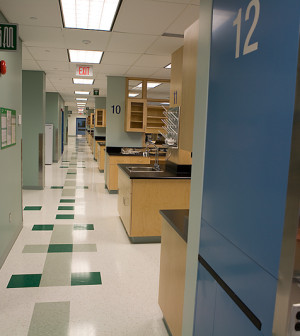- Could Your Grocery Store Meat Be Causing Recurring UTIs?
- Are You Making This Expensive Thermostat Error This Winter?
- Recognizing the Signs of Hypothyroidism
- 10 Strategies to Overcome Insomnia
- Could Artificial Sweeteners Be Aging the Brain Faster?
- Techniques for Soothing Your Nervous System
- Does the Water in Your House Smell Funny? Here’s Why
- Can a Daily Dose of Apple Cider Vinegar Actually Aid Weight Loss?
- 6 Health Beverages That Can Actually Spike Your Blood Sugar
- Treatment Options for Social Anxiety Disorder
When Complications Arise, Some Hospitals Get Paid a Lot More

Medicare pays some U.S. hospitals two to three times more than others to care for older adults who experience complications after major surgery, a new analysis finds.
Those higher payments aren’t always associated with better clinical care, the study authors said.
The findings suggest that some hospitals deal with surgical complications, such as serious bleeding, infection and kidney failure, more efficiently than others, the authors noted.
“If we had found that they’re spending more money, but they’re actually saving people’s lives, it’s worth it, right?” said Dr. Hari Nathan, the study’s senior author.
“But that’s actually not what we found,” said Nathan, an assistant professor of surgery at the University of Michigan Medical School.
“They’re not actually getting any better outcomes,” he said.
Hospitals with the highest “cost of rescue” — the costs of keeping these patients from dying — also had higher adjusted rates of serious complications, the analysis showed.
Patients at these higher-cost hospitals were no more likely to survive the first month after their operation, or survive at all, than patients at lower-cost hospitals, according to the study.
Using claims data for Medicare — the government-funded insurance program for older U.S. adults — Nathan’s team examined payments to hospitals for four elective surgeries from 2009 to 2012. These were: replacing a hip, repairing an aortic aneurysm, or having a section of lung or intestine removed. They also assessed patient outcomes.
These four procedures were selected because they’re common, high-risk operations, the study authors said. There’s no reason to believe the degree of variation would be different for other surgeries, Nathan said.
Records on more than 576,000 patients were evaluated. More than one in 10 patients having an aorta, lung or intestinal operation and one in 50 hip replacement patients suffered from one of eight major complications, the study found. Besides infections and serious bleeding, these included blood clots, pneumonia, heart attack, and lung or kidney failure.
Death rates among patients with complications ranged from 3.4 percent for hip replacements to 18 percent for having a section of lung or intestine removed.
Medicare paid the highest cost-of-rescue hospitals more than $60,000 for repairing an abdominal aortic aneurysm. The lowest cost-of-rescue hospitals got $23,000. Payments for total hip replacement were $41,000 for the highest cost-of-rescue hospitals and $19,000 for the lowest, according to the study. There were similar disparities for the other procedures, Nathan said.
Nathan was surprised by the wide degree of variation since Medicare’s payment system is set up to minimize those differences.
Differing hospital base prices or charges were not a factor, he said. The researchers adjusted the data to account for differences, such as higher labor costs in expensive parts of the country, so that they could compare cost of services across hospitals.
Dr. Nader Massarweh is an assistant professor of surgery at Baylor College of Medicine in Houston. “Complications can happen even when everything is done correctly before, during and after an operation,” said Massarweh, who was not involved in the study.
“Having said that, some hospitals may simply be better at recognizing when there is a problem and starting treatment earlier,” he said.
What does this mean for patients?
“Be proactive” in asking questions about the operation, the risks and what to expect during postoperative care and recovery, Massarweh said. And, he added, if you aren’t satisfied with the answers, consider a different surgeon or a different hospital.
The good news: Medicare is beginning to reward hospitals that provide efficient care and penalize those that do not, Nathan noted. The new financial incentives have already kicked in for knee and hip replacements and will soon roll out for cardiac procedures, he said.
“So there’s a built-in incentive for all hospitals to try to address these issues, try to keep their costs down. And the best way to keep costs down is to keep quality high,” Nathan said.
The study was published online Oct. 5 in JAMA Surgery.
More information
Here’s more on Medicare’s hip and knee payment initiative.
Source: HealthDay
Copyright © 2026 HealthDay. All rights reserved.










